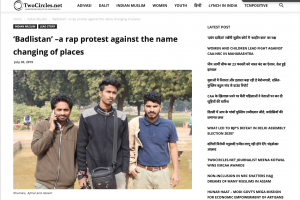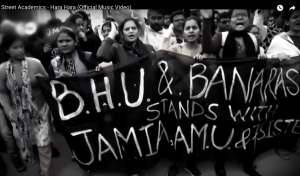Music for protest: Azadi and Inqilab as the new Hindustani beats

By Najiya O, TwoCircles.net
As marches and rallies dominate the most commonly practised ways of protest, the youth are now searching new ways to protest against the Citizenship Amendment Act (CAA), the National Register of Citizens (NRC) and the National Population Register (NPR) – the latest being rap music.
“Take into the streets, take into the streets - Azadi is the new Hindustani beat” are the lines of a rap music video titled ‘Streetocracy’ from the band ‘Osapraka’. While strongly voicing against the citizenship law, the rap album emphasizes that it is time to hit the streets to protest. The unique thing about this album is, it is highlighting issues that went without much protest - demonetization, abrogation of Article 370 and arrest of the Muslim youth in UP in the light of CAA protests. The video shows footages of original protests that had taken place in different parts of the country, terming them as the ‘second freedom struggle’. The debutant album ‘Badlistan’ of the band 'Osapraka’ with Shumais as the lyricist and Rameesudheen as the editor which have earlier been covered by TCN (‘Badlistan’ –a rap protest against the name changing of places) have also produced a video with strong lyrics and fine editing.

‘Citizen Number ‘21’, in Malayalam released on February 8, begins when the voice of Amit Shah on TV disturbs a grandmother who is trying to put the grandchild to sleep singing songs of the 1921 struggle. When government officials come to the house asking for documents, the grandmother sends them off saying not to scare those who have stood strong before the Portuguese and the British. Sarasa Balusseri, who rose to fame through the film ‘Sudani from Nigeria’ winning accolades has played the grandmother. Already having recorded 50000 views, the video is another one to voice the struggles Indians have had to go under colonial powers. As the video progresses, the grandmother’s talk in Malayalam keeps reminding one of the past valour of Indians who have been united in the freedom struggle irrespective of their language, caste, culture or religion. Haris Saleem’s rap in English then continues detailing the prevalent conditions as a young man is reading Telegraph, a grandmother is cutting beef and some children are playing football. The final footage is an original video of Raniya Sulaikha, student in Delhi, who is calling the slogan ‘Assalam Neelsalam Intifada Inqilab’. The video album is directed by Sandeep and produced by Hum Bhi Production House under the banner of Windowseat Pictures.
Among the most popular music and rap protests from the youth is the video released on January 20, 2020, ‘Aavoola’ by ‘Allalla the Band’ has already received about1.5 lakh views. The lines by Suhail Abdul Hameed are in various styles and slangs in Malayalam and the song is being widely shared on social media. Roughly translated as “Don’t go for it Modi, You can’t do it, be it you or your Shahji (Amit Shah) or your Yogi”, it mentions the history of Muslims fighting against the colonial powers and moves on to project the unity of Indians, while also hinting towards the brutality of the authorities. The video also shows powerful images of Tipu Sultan, Ali Musliyar and Variyamkunnath Kunjahammed Haji, Ali brothers, Periyar EV Ramaswamy Naicker and Dr BR Ambedkar along with those of Chandrashekhar Azad Ravan, Rohit Vemula, Najeeb Ahmed and Fatima Nafis. Directed and edited by Hanan Muhammed, the song reminds Modi to think of the fate of Hitler.

It is noteworthy that the youth who are always disregarded for listening to blasting music and ignoring realities, a bunch of them have come with quite an innovative and strong form of protest through music albums to register their dissent against any form of divide and rule policy. An example can be seen through ‘Mera Haq’, a rap music video album from the team ‘Halal Hip Hop’ which is a culmination of English, Malayalam and Hindi languages. Quoting Faiz and Muzii in its third video, Shad and others from the ‘Halal Hip Hop’ team can be seen singing along - ‘Tera baap ka nahi, Tera baap ka nahi, Yeh Hindustan tera baap ka nahi’. To voice its idea of secularism and as a gesture of response to PM Modi’s comments on the attire of protestors, the video shows shirtless young men with ‘this is our dress code’ painted on their bodies. Further reinforcing its idea that India does not belong to a particular caste or community, the video speaks of the unity of Hindus and Muslims during British times. It also hints that the entry of the Hindutva groups through the murder of Mahatma Gandhi was actually the start of communalism.

Released on February 9, ‘Preamble to an Indian Citizen’ is a uniquely figurative music video written and directed by Adarsh Kumar Aniyal. The video begins from the footage showing protests against the ousting of Ummukulsumma from the country, and goes forward to touch more current issues troubling the country. The characters are shown painting the portrait of B R Ambedkar while strongly voicing discrimination in the name of caste and religion. The video raises some significant questions on identity politics like ‘Who are you to tell us to go?’, ‘Who entrusted you the burden of patriotism?’ and so on. As a powerful album that vehemently attacks caste discrimination, the video has already received more than 15,000 views on the YouTube channel.
“I will call Inqilab, I will call Jai Bhim, I will live as a Musalman, I will live as a Dalit,” are the loud slogans from the music album ‘Hara Hara’ which means to destroy fascist hatred. The album performed by Haris Saleem is one of the several audio and video music albums released by ‘Street Academics’ on YouTube. Besides expressing its advocacy on anti- CAA protests, the video has visuals of Mamata Banerjee, Kapil Sibbal and Asaduddin Owaisi leading protests marches in cities and inside the Parliament. It also shows the protests on the steps of Jama Masjid in Delhi with slogans like ‘Nahi chalegi, nahi chalegi’ and ‘Hara Hara’ saluting the girl students of Jamia for their courage. The video ends with the famous quote by Martin Luther King Junior which says that ‘the silence of the good people is more tragic than the oppression and cruelty of the bad people.’
